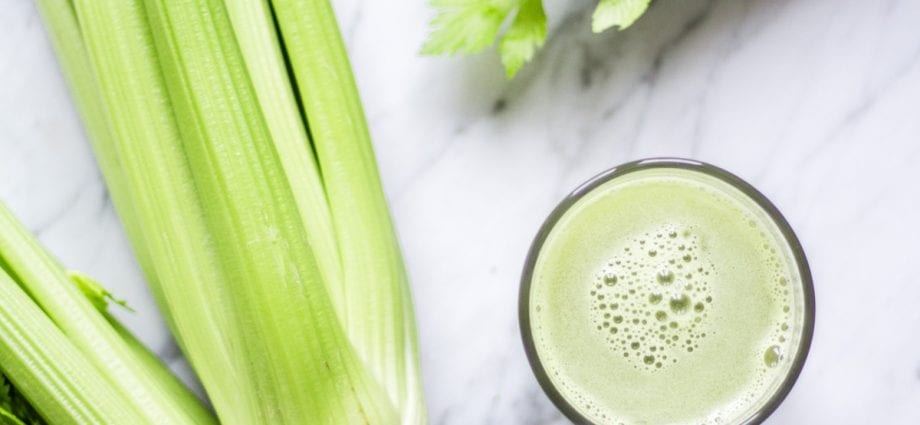产品描述
Celery is a biennial plant from the Umbrella family.芹菜是伞形家族的两年生植物。 The homeland of the plant is the Mediterranean, where it still grows in a wild, non-domesticated form.该植物的家园是地中海,在那里仍以野生,非驯养的形式生长。
芹菜的历史
这种蔬菜大约有 20 种已知种类。 芹菜有一个大块茎——根、多汁的叶柄和顶部,类似于欧芹。 所有部分均可食用。
芹菜甚至在古希腊也被使用——他们装饰住宅以抵御邪恶的灵魂,并为胜利者编织花圈。 人们认为这种植物会带来好运,通常与大蒜和洋葱一起收获。
它最初被用作药用植物,直到17世纪才开始食用。 芹菜于19世纪来到美国,开始种植。 芹菜有其半官方的首都-阿瓦达州科罗拉多州的一个城市被称为“世界芹菜之都”。
成分和卡路里含量
- 芹菜的热量含量13大卡
- 脂肪0.1克
- 蛋白质0.9克
- 碳水化合物2.1克
- 水94克
- 膳食纤维1.8克
- 有机酸0.1克
- 单糖和二糖2克
- 淀粉0.1克
- 维生素A,B1,B2,B6,B9,C,E,PP,β-胡萝卜素
- 矿物质钾(430毫克),钙(72毫克),镁(50毫克),钠(200毫克),
- 磷(77毫克),铁(1.3毫克)。
类型和品种

Petiolate celery is grown for the juicy stalks.叶柄芹菜长出多汁的茎。 It can be green and white, but these are not different varieties: the plant will acquire a white color if it is piled up, covering the petioles with earth.它可以是绿色和白色,但是它们不是不同的品种:如果将植物堆放起来,将其覆盖在叶柄上,它将获得白色。 The taste of white celery is more delicate and less bitter than that of green celery, and it lasts longer, therefore it is much more appreciated.白芹菜的味道比绿芹菜的味道更细腻,更不苦,并且持续时间更长,因此倍受赞赏。
Green and white celery stalks are more juicy and tender than, say, parsley, they are most often used in salads, and the leaves are used as spicy herbs.与芹菜相比,绿色和白色的芹菜茎更汁多,更嫩,它们最常用于沙拉中,而叶子则用作辛辣草药。 Celery goes equally well with vegetables, meat, fish, poultry, mushrooms, and is suitable for fatty goose or duck soups.芹菜适合搭配蔬菜,肉,鱼,家禽,蘑菇,也适用于肥鹅或鸭汤。 Its exquisite spicy aroma sets off the flavors of beans, eggplant, cabbage, carrots and potatoes.其精致的辛辣香气散发出豆类,茄子,卷心菜,胡萝卜和土豆的风味。
Root celery is an aromatic and tender root vegetable.根芹菜是一种芳香而嫩的根菜。 It is added to soups, pickles and stews.将其添加到汤,酱菜和炖菜中。 Freshly grated, it is especially beneficial when combined with grated raw apples (in a one to three ratio), carrots, and herbs.新鲜磨碎时,与磨碎的生苹果(以XNUMX到XNUMX的比例),胡萝卜和草药混合使用时,它特别有益。 Boiled celery root tastes like potatoes.煮熟的芹菜根味道像土豆。
Leafy celery (or chive celery) is a plant with medium-sized leaves and a spicy aroma.叶芹菜(或韭菜芹菜)是一种具有中等大小的叶子和辛辣香气的植物。 The leaves are sometimes finely chopped and used to decorate dishes, but more often they are added to salad, soup or sauce.叶子有时会被切碎并用于装饰菜肴,但更多时候是将它们添加到沙拉,汤或酱汁中。
芹菜籽也用于烹饪——这是一种有趣的香料。 例如,他们制作芹菜盐——芹菜籽和盐的混合物。 出于同样的目的,您可以使用干芹菜根。
如何选择和储存

根芹菜无叶柄,通常具叶柄,通常没有根。 所有类型的芹菜都有非常明亮的辛辣香气。 芹菜的根和茎必须牢固。 叶和叶柄芹菜应为淡绿色。
In order for petioled celery to be well preserved, it is dipped with the bases of the stalks in cold salted water.为了更好地保存带芹菜的芹菜,将其与茎梗基部浸入冷盐水中。 Otherwise, it will quickly wither in the refrigerator.否则,它将迅速在冰箱中枯萎。
多叶芹菜适合带根购买,放在锅中-这样保存的时间更长。
芹菜的好处
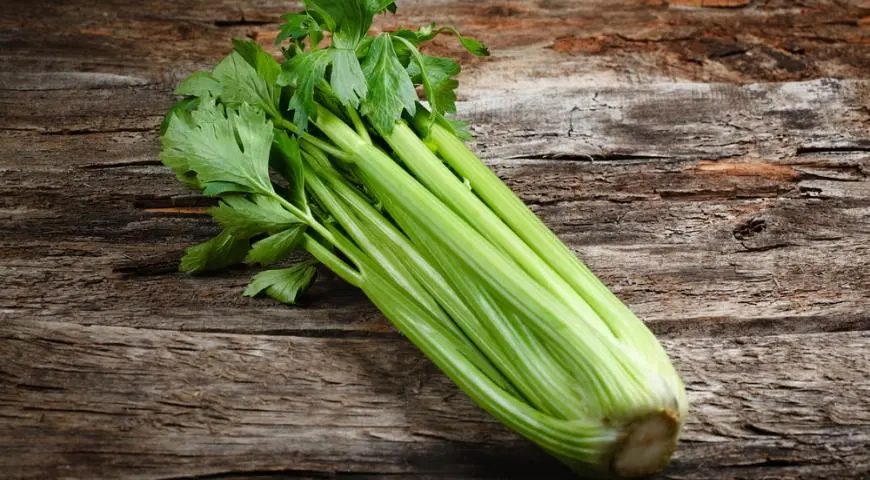
芹菜含有多种维生素,其中维生素C居首位——100克含8毫克。 植物的所有部分都含有氨基酸和微量元素:硼、钙、氯等。 芹菜富含纤维和精油,以及维生素 A、E、K 和 B 族维生素。
Eating celery in food increases the vitality of the body, eliminates drowsiness and apathy, and accelerates the elimination of toxic substances.在食物中吃芹菜可增强身体活力,消除嗜睡和冷漠感,并加速消除有毒物质。 The introduction of celery into the diet is a good prevention of age-related cardiovascular diseases, disorders of water-salt metabolism and inflammatory processes.在饮食中加入芹菜可以很好地预防与年龄有关的心血管疾病,水盐代谢紊乱和炎症过程。
Celery is often used in many diets due to its low calorie content and increased metabolism.芹菜因其低卡路里含量和增加的新陈代谢而经常用于许多饮食中。 The juice of this vegetable stimulates the production of gastric juice, which has a positive effect on the absorption of food.这种蔬菜的汁液刺激胃液的产生,对食物的吸收有积极作用。
The seed extract is used as an antispasmodic and analgesic agent to reduce muscle spasms, cramps and joint pain.种子提取物用作解痉和镇痛剂,以减轻肌肉痉挛,痉挛和关节痛。 The hypnotic and sedative effect of celery seeds is also known.芹菜种子的催眠和镇静作用也是已知的。
Celery is a well-known aphrodisiac that is beneficial for the male body.芹菜是一种众所周知的壮阳药,对男性身体有益。 The plant hormone androsterone increases potency and libido.植物激素雄甾酮增加了效能和性欲。
芹菜危害
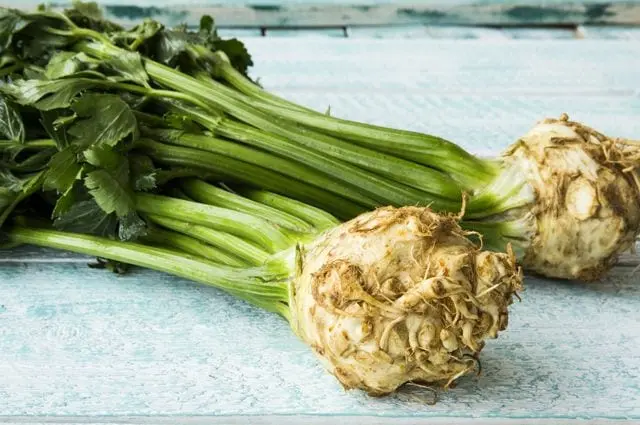
There are contraindications for eating celery.吃芹菜有禁忌症。 The main contraindication is pregnancy and lactation.主要禁忌症是怀孕和哺乳。 Celery is not dangerous in minimal quantities, but it is important to limit its consumption.芹菜的最低添加量并不危险,但限制其消耗非常重要。
Celery seeds contain substances that cause uterine contraction and may pose a risk of miscarriage.芹菜种子中含有引起子宫收缩的物质,并可能引起流产。 The substance apiol, found in the stems, tubers and leaves of celery, also causes uterine contractions and can cause bleeding, so it is not recommended to eat celery during menstruation.芹菜茎,块茎和叶子中发现的apiol物质也会引起子宫收缩,并可能引起出血,因此不建议在月经期间食用芹菜。
胃肠道疾病的人不应以原始形式食用植物的任何部分,最好加热蔬菜。 “
芹菜在医学中的用途
芹菜首先作为减肥产品。 为了消化它,消耗的卡路里超过植物本身所含的卡路里,这被称为“负卡路里含量”。
每100克芹菜的任何部分都含有约25 – 32 kcal。 芹菜菜消化良好,可加快新陈代谢,降低胆固醇并清除多余的水分,有助于对抗充血和消除肿胀。
Celery is also used in cosmetology.芹菜也用于美容。 Decoctions and infusions for facial skin and hair strengthening are prepared from it.由此制备用于面部皮肤和头发增强的煎药和输注液。 Juice and decoction of this plant can remove cosmetics from the face, toning and refreshing the skin.这种植物的汁液和水煎剂可以去除脸上的化妆品,从而使肤色恢复清爽。
Celery has anti-inflammatory and wound healing properties, accelerating the regeneration of damaged skin.芹菜具有抗炎和伤口愈合的特性,可加速受损皮肤的再生。 It is used for various skin diseases: allergies, eczema, urticaria.它用于多种皮肤疾病:过敏,湿疹,荨麻疹。
Celery is an extremely healthy product for the elderly.芹菜是一种非常健康的老年人产品。 The effect of celery consumption on lowering cholesterol and blood sugar levels has been proven, which is the prevention of atherosclerosis, diabetes mellitus and cardiovascular diseases.食用芹菜对降低胆固醇和血糖水平的作用已得到证实,可以预防动脉粥样硬化,糖尿病和心血管疾病。
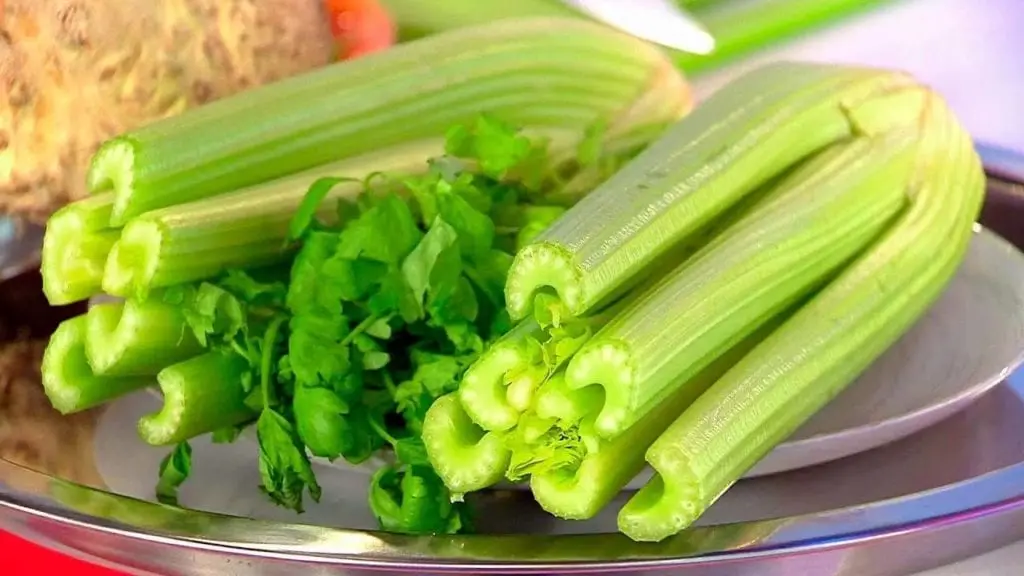
Celery is useful for people with inflammatory diseases of the joints: arthritis, arthrosis, rheumatism.芹菜对患有关节发炎性疾病的人有用:关节炎,关节炎,风湿病。 Substances from celery stalks have a diuretic effect, helping to remove uric acid crystals, which is also useful for patients with cystitis and other diseases of the genitourinary system.芹菜茎中的物质具有利尿作用,有助于去除尿酸结晶,这对于患有膀胱炎和泌尿生殖系统其他疾病的患者也有用。
Fresh celery has a positive effect on male sexual activity.新鲜芹菜对男性性行为有积极影响。 This vegetable contains the plant hormone androsterone, which is responsible for the manifestation of secondary sexual characteristics, the level of potency and the synthesis of its own sex hormones.这种蔬菜含有植物激素雄甾酮,它负责表现继发性特征,效力水平和自身性激素的合成。
Essential oils extracted from celery seeds can help reduce pain.从芹菜种子中提取的精油可以帮助减轻疼痛。 Coumarins, which are rich in celery, help with migraines.富含芹菜的香豆素可帮助偏头痛。
Celery is useful for constipation as it has a mild laxative effect.芹菜具有温和的通便作用,可用于便秘。 The high fiber content improves the intestinal microflora and accelerates the elimination of toxins and toxins.高纤维含量改善了肠道菌群,并加速了毒素和毒素的清除。
芹菜在烹饪中的使用
All parts of the plant are eaten, even the seeds are used.食用植物的所有部分,甚至使用种子。 Juicy stems and leaves are mostly eaten fresh, while the tuber is often stewed and added to stews and soups.多汁的茎和叶大多是新鲜食用的,而块茎经常被炖,然后加入炖菜和汤中。 Heat treatment allows people with gastrointestinal diseases to eat this vegetable.热处理可使患有胃肠疾病的人食用这种蔬菜。
芹菜和苹果沙拉
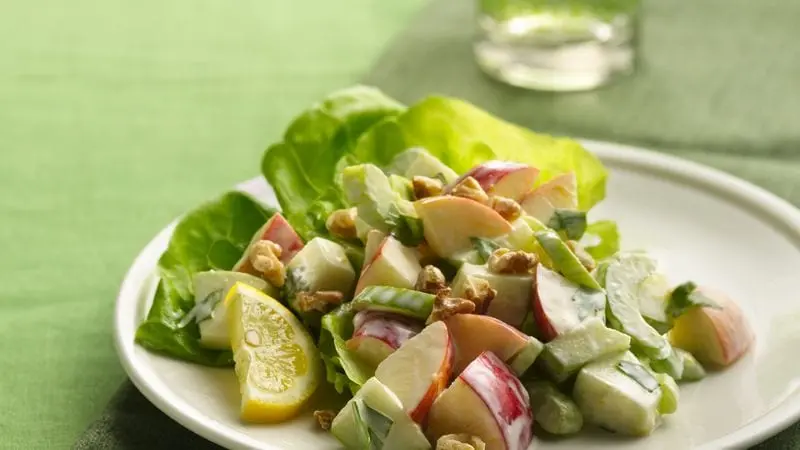
一种极好的维生素沙拉,适合轻食和饮食。 您可以添加切碎的核桃和您最喜欢的蔬菜。 为了更饱腹感——凝乳奶酪或马苏里拉奶酪。
成分
- 芹菜茎– 2片
- 新鲜胡萝卜– 1个
- 糖醋苹果1 pc
- 酸橙——楔形汁
- 橄榄油、盐、胡椒——品尝
考前准备
Wash, peel and cut all fruits and vegetables into medium cubes.将所有水果和蔬菜洗净,去皮并切成中等大小的方块。 Stir, put in a salad bowl.搅拌,放入沙拉碗。 In a bowl, combine olive oil, salt and spices.在一个碗里,混合橄榄油,盐和香料。 Season the salad and sprinkle with herbs.调味沙拉并撒上香草。










